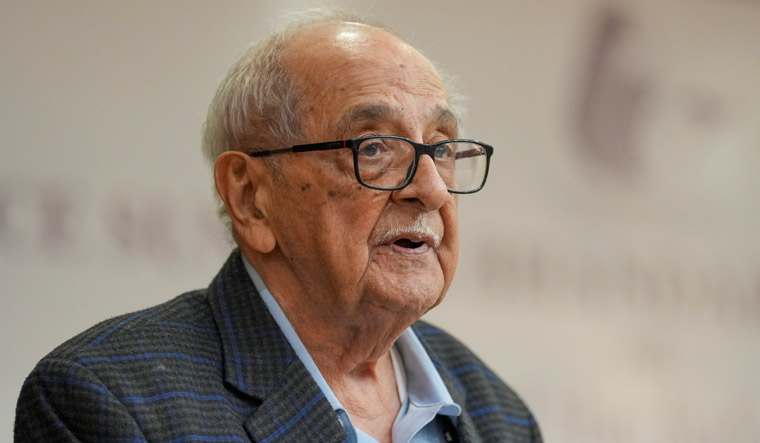A few days ago, when this correspondent entered the drawing room of Fali S. Nariman's house in south Delhi to seek his opinion on the landmark judgment of the Supreme Court in the Electoral Bonds Scheme case, he was engrossed in a vibrant discussion with a couple of junior lawyers over a case in the Supreme Court that they were preparing for.
ALSO READ: Tributes pour in as doyen of constitutional law dies
At 95, Nariman's voice was loud and clear as he forcefully argued over the finer points of law with regard to the case. He enriched the discussion with inputs derived from his own experience as a lawyer spanning over seven decades. He drew from his own vast memory references to cases heard long ago. And, at times, he also got impatient if he felt his ideas were not getting across. He wrapped up the debate, asking the lawyers to come back after having reworked their case with the points discussed that day.
Immediately afterwards, Nariman sat down with the Supreme Court's judgment in the Electoral Bonds Scheme case to analyse for THE WEEK the import of the verdict and highlight its main points. The grand old man of Indian law was, till the very end, deeply and actively involved with matters pertaining to the country's legal system.
If he was not providing his expertise for court cases, he was writing commentaries on issues related to the Indian legal system. He came out with his final book only a few months back, simply titled 'You Must Know Your Constitution', which looks at all the 395 Articles of the Constitution and the amendments made in it up to July 31, 2023.
What Nariman said mattered tremendously. He was heard with great interest, regarded as the voice of sanity, and the points made by him trusted to be the correct assessment of the situation. The veteran jurist had a colossal presence in the field of Indian law and was the most respected voice in the Indian legal system.
In recent years, Nariman, who was totally committed to the ideals of secularism and democratic principles, was vocal about majoritarian politics becoming a dominant force and posing a threat to the concepts of tolerance. He was pained at what he felt was a deepening of communal and social divides.
He wrote in his last book that super-majoritarianism has created more disparity than unity. In his assessment, coalition governments are better for the country, even if they take longer to arrive at a decision compared to a government with a full majority, because it is possible to place different points of view and ideas on the table.
In a rare media interaction, and one of his last, Nariman told THE WEEK, “It (super-majoritarianism) has been the hallmark of the major political parties throughout our 75 years. The Congress did it. The BJP is doing the same thing. Keeping the country together is far more important. Unfortunately, we don't have a Gandhi today.”
In the backdrop of the functioning of the Supreme Court coming in for increasing criticism and a perception forming about the judiciary buckling under pressure from the executive, Nariman wrote a book titled God Save the Hon'ble Supreme Court. The book, which was published in 2018, was a scathing critique of the manner in which the Supreme Court was being run. But he was also not happy with the decision of the four senior-most judges of the court to go public with their grievances.
Above all, Nariman's approach to law was guided by his unwavering belief in the Constitution and his complete commitment to the principles that the document espoused. He was completely intolerant towards any discussion on whether the country needed a new Constitution. He believed that the Constitution is the one thing that has held the country together.
“That discussion should be throttled at the start,” Nariman had declared when asked in THE WEEK interview about the talk in certain quarters that the country needs a new Constitution.
The voice of the Constitution's biggest champion has fallen silent. But his words will continue to resonate.



